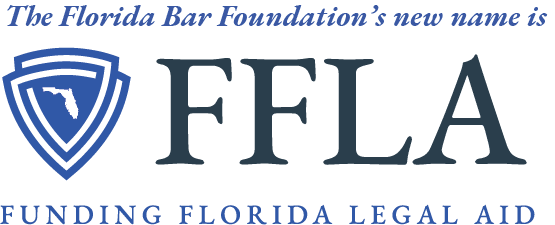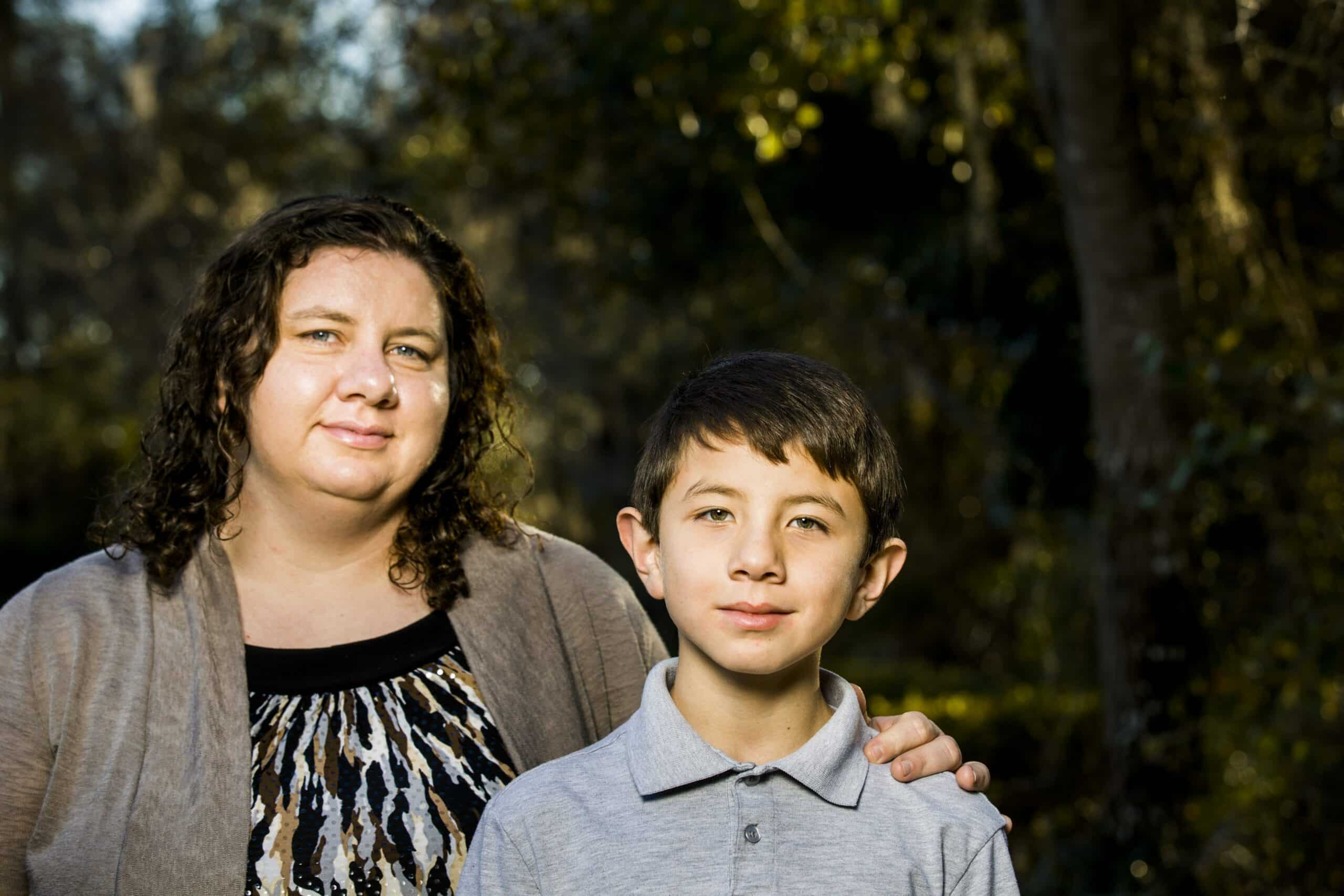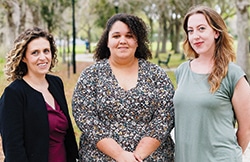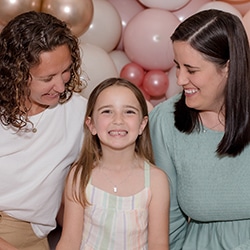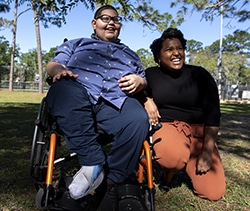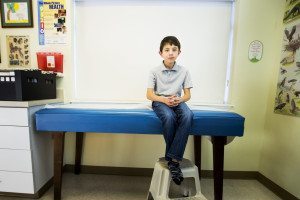
Alex Rodriguez, 11, was one of five petitioners in a rule challenge brought by the Florida State University Public Interest Law Center, a Florida Bar Foundation grantee, against the Florida Department of Health for removing children from the Children’s Medical Services Network based on a parent survey, with no input from pediatricians.
When Jennifer Rodriguez got a call from a nurse case manager last May asking her to take a survey about her son Alex, 11, she had no idea that her responses could get him tossed from a Medicaid specialty managed care program for chronically ill and disabled kids.
“I answered her questions honestly but she needed a yes or a no, and to me some questions it’s not a direct yes or a direct no,” Rodriguez said.
The third question was one of those: “Is your child limited or prevented in any way in his or her ability to do the things most children of the same age can do?”
Although Alex has a heart defect and kidney stones and sees a cardiologist, nephrologist and urologist regularly, Rodriguez answered no, as did parents whose children are blind, have cleft palates, birth defects, diabetes, and other medical problems that require coordinated and specialized care.
Based solely on parents’ answers to the five survey questions, the Florida Department of Health (DOH) removed 13,074 children from Children’s Medical Services (CMS), a program their doctors had deemed necessary to ensure they could provide the care their patients needed.
The generalized application of the survey questions became the basis of a successful rule challenge brought by the Florida State University College of Law’s Public Interest Law Center, where children’s advocacy projects were funded in 2015 by a $107,000 Children’s Legal Services grant from The Florida Bar Foundation.
When Alex and several of his other patients were dropped from CMS, Dr. Louis St. Petery, a Tallahassee pediatric cardiologist, began referring parents to Paolo Annino, director of the Public Interest Law Center’s Children’s Advocacy Clinic. Annino held meetings with law students Megan Shoemaker, Steven Reardon and Justin Karpf and pro bono attorney Mary Clark, a retired administrative law judge, to review the individual cases and figure out a legal strategy. Matthew Dietz, litigation director of Disability Independence Group Inc. also provided pro bono support.
After talking to several parents, the team realized the survey was being used to determine continued eligibility for the 78,000 pediatric Medicaid patients already in the program, which they believed made it an unadopted rule.
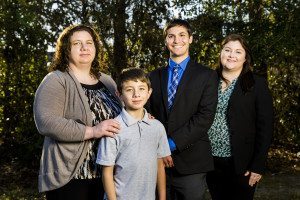
Jennifer Rodriguez (left) and her son Alex with law students Justin Karpf and Megan Shoemaker (right)
“Clients who’d never met got this same kind of call, the same kind of letter, got the same questions, gave the same kind of answers,” Karpf said.
Under Florida law, rules applied by state agencies in administering programs like CMS have to go through rulemaking procedures that include public input. In the case of CMS, that should have included input from medical professionals. But that hadn’t happened.
“The whole thing is so perverse,” said Dr. Jeffrey Goldhagen, chief of the division of community and societal pediatrics at UF Health Jacksonville.
“Imagine you have a medical problem and you are cared for in the intensive care unit. You have specialized nurses, you have specialized doctors, you have specialized systems and equipment and so forth,” Goldhagen said. “That’s what CMS is for children outside the hospital. Now imagine going into the intensive care unit and just removing kids, saying, ‘You don’t need to be here, you don’t need to be here, and you don’t need to be here.’ That’s what happened, and with a very inappropriate tool.”
Goldhagen said DOH officials claimed children could get comparable care from other Medicaid managed care organizations, but to him that was like saying patients could get the same care on a regular floor of the hospital that they would get in the intensive care unit.
“The reason there is an intensive care unit is because that’s not true, and the reason we have CMS is because that’s not true,” Goldhagen said.
In June, a month after DOH began using the survey tool, Annino and his students filed the rule challenge, followed in July by individual fair hearings for each of their clients. Five of St. Petery’s patients, including Alex Rodriguez, were part of the rule challenge. At first DOH began screening all of the Children’s Advocacy Project’s clients back into CMS, thereby taking away their standing in the rule challenge.
But in negotiations DOH agreed to grant standing to avoid depositions and a hearing. Instead, each side submitted proposed orders to the Administrative Law Judge Darren Schwartz, whose Sept. 22 final order declared the screening tool invalid because it was not adopted through the rulemaking process. Schwartz directed the DOH to stop using it immediately.
Just two days after Schwartz issued his final order, Katy DeBriere, a staff attorney at Jacksonville Area Legal Aid, attended a conference funded by The Florida Bar Foundation for its Children’s Legal Services grantees at which Annino presented on the rule challenge.
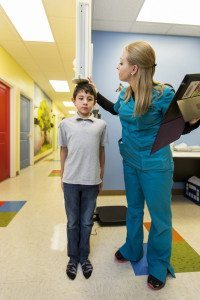
Alex has a heart defect and kidney stones and sees a cardiologist, nephrologist and urologist regularly.
As Annino explained, while the final order handed a huge victory to Florida’s chronically ill, low-income children, it said nothing about the more than 13,000 who had already been removed from CMS using the tool, an issue his team is working to address.
Through her work with the Northeast Florida Medical Legal Partnership, DeBriere knew Goldhagen, so she suggested that he could refer disenrolled children to Annino. Soon in addition to Dr. St. Petery’s cardiac patients, the legal team from FSU had 11 cleft palate patients from a CMS-certified cleft lip and palate program in Jacksonville. By March 8 they had gotten all of them reenrolled.
In October, the DOH held a rulemaking workshop that led to the creation of a CMS Clinical Eligibility Attestation form with four pages of CMS-eligible diagnoses that doctors can select. Shoemaker and Karpf collected letters from doctors that resulted in nine diagnoses being included in the list. While the agency is still using parent surveys, doctors can override the survey with the form, and parents can request to have a doctor present when they answer the survey questions. The agency also will allow for an open comment period in April during which doctors and parents can request additions to the diagnoses on the new form.
Now, Annino and his students are working to figure out how to make sure the remainder of the children removed from CMS last summer will be made aware of the opportunity to be rescreened since the letter in which CMS notified parents that their child was no longer eligible did not provide any information about their right to appeal. They tried asking DOH to notify all of the affected parents, but the agency declined.
Children’s Legal Services Campaign
“You have to remember these parents don’t know about administrative law, they don’t know about due process, their right to a hearing, these federal cases and the precedent. This is not something that parents think about,” Shoemaker said.
The next step for the FSU legal team will be to try to apply the law to force the agency’s hand.
“The state needs to let those parents know that their kids were screened out by a tool that was declared invalid, and they have the opportunity to ask to be rescreened if they would like. Some of them will be on the attestation list, and that will make it easy. Others will answer yes to question 3, and that will make it easy,” said St. Petery, who has been providing care under CMS for 42 years and once served as the program’s statewide interim director.
“These kids don’t have any advocates, and Paolo and his students are advocates for them, and I try to advocate for them. The parents of poor children don’t contribute to political campaigns. They don’t have a voice, politically, so the system just runs over them. The kids we are advocating for didn’t choose to be born into poor families. I think we owe it to these kids to do the best thing we can for them. And that’s not easy in this system.”
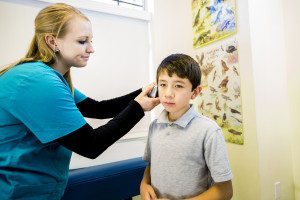
Alex having his temperature checked by a nurse.
Although the students who worked on the rule challenge will be graduating in May, Annino will bring in new students to work on the CMS issue going forward and may also collaborate with more pro bono attorneys.
“There is a big need in Florida just because we are so miserly. I think other states may cut their highway departments, but we cut chronically ill kids. That’s the reality of it,” Annino said. “So there is just a lot of work to be done here to make sure federal protections and the state protections are enforced. And we couldn’t do it without The Florida Bar Foundation. There is no way we could do it without them. The Florida Bar Foundation is not a come-lately. They have been for years supporting the Public Interest Law Center and children’s advocacy throughout the state of Florida.”
For the FSU Public Interest Law Center’s work on the rule challenge, The Florida Bar Foundation named it first runner-up for the 2016 Steven M. Goldstein Award for Excellence, which recognizes a project of significant impact undertaken by a Legal Assistance for the Poor grantee. The award memorializes Goldstein, a former legal services attorney and FSU law professor. Goldstein, who died in 1994 at the age of 49, was nationally revered for his dedication to upholding the constitutional rights of those with unpopular causes. He chaired the Foundation’s Legal Assistance for the Poor grant committee and at the time of his death was in line to become an officer on the Foundation’s board.
“This award has special meaning for me because Professor Goldstein was both my teacher and mentor,” Annino said.
The award will be presented at the Foundation’s annual dinner June 16 in Orlando at The Florida Bar Annual Convention. It comes with $10,000 to be used by the Public Interest Law Center at its discretion and $1,000 to be used as training funds.
More than 40 percent of the Foundation’s funding for Children’s Legal Services projects come from donations. Florida Bar members can elect to support children’s legal advocacy through a voluntary donation on their Florida Bar annual fee statement, and anyone can donate online at www.TheFloridaBarFoundation.org/children.
View a List of Children’s Legal Services Grants Donate to Children’s Legal Services